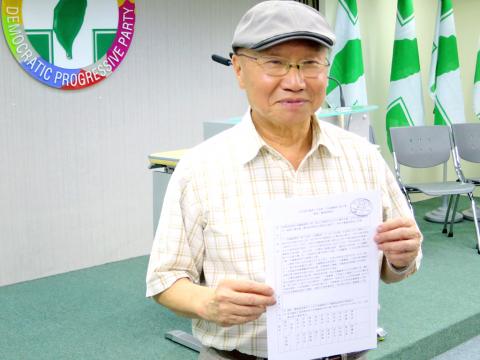Former Democratic Progressive Party (DPP) legislator Chen Zau-nan (陳昭南) yesterday submitted a petition demanding that the party freeze the Taiwanese independence clause in its party charter in the upcoming party congress, which he said would help the DPP regain power.
The petition called for freezing the first article of the party charter, usually known as the Taiwanese independence clause, which calls for the “establishment of an independent sovereignty known as the Republic of Taiwan.”
The petition received more than 40 signatures, 20 of which came from party representatives.

Photo: Chen Hui-ping, Taipei Times
Chen said he had made the same proposal in 2000, adding that Taiwan was already an independent sovereignty under the name of the Republic of China and its future should be decided by its 23 million residents.
The clause had fulfilled its purpose and the DPP has no need to further push Taiwanese independence, Chen said.
The move would improve the party and the nation, Chen said, adding that the cross-strait issue should not be an obstacle barring the DPP from returning to power and keeping the KMT in power.
DPP Chairperson Tsai Ing-wen (蔡英文) knew nothing of the proposal until he brought it up yesterday, Chen said, adding that although he could not advance the issue as he was not a national party representative, he would continue to push the proposal.
DPP Legislator Tsai Chi-chang (蔡其昌) said freezing the clause would have no real meaning, adding that the Resolution on Taiwan’s Future (台灣前途決議文) had in large part superseded the Taiwanese independence clause.
DPP legislators Lee Ying-yuan (李應元) and Chen Chi-mai (陳其邁) both disagreed with the proposal to freeze the clause, with Chen Chi-mai saying that the clause formed part of the basic tenet of the DPP charter and represented the values and the spirit of the party.
Lee said the clause was a precious historic article and there was no need to freeze it because the spirit of the resolution was accepted by party members and by the international community.
National Cheng Chi University professor Tung Chen-yuan (童振源), one of the petition’s drafters, said the clause had become an obstacle to the DPP, and resolving the issue depended on the determination and willingness of Tsai Ing-wen.
The clause is detrimental to Taiwan, Tung said, adding that even if the DPP were willing to implement the clause, it lacks the power to do so in the near future because ratifying the Constitution requires the support of three-quarters of the Legislative Yuan.
Freezing the clause would be a step toward unifying Taiwan’s consensus on cross-strait issues, Tung said.
Meanwhile, student activist leader Chen Wei-ting (陳為廷) spoke against the freeze on Facebook, saying it would be an illogical move and like an ostrich burying its head in the sand in response to danger.
If the DPP were to agree to the freeze, it would need to brace itself to be replaced as the main opposition party, he said.
Additional reporting by CNA

INVESTIGATION: The case is the latest instance of a DPP figure being implicated in an espionage network accused of allegedly leaking information to Chinese intelligence Democratic Progressive Party (DPP) member Ho Jen-chieh (何仁傑) was detained and held incommunicado yesterday on suspicion of spying for China during his tenure as assistant to then-minister of foreign affairs Joseph Wu (吳釗燮). The Taipei District Prosecutors’ Office said Ho was implicated during its investigation into alleged spying activities by former Presidential Office consultant Wu Shang-yu (吳尚雨). Prosecutors said there is reason to believe Ho breached the National Security Act (國家安全法) by leaking classified Ministry of Foreign Affairs information to Chinese intelligence. Following interrogation, prosecutors petitioned the Taipei District Court to detain Ho, citing concerns over potential collusion or tampering of evidence. The

NEGOTIATIONS: Taiwan has good relations with Washington and the outlook for the negotiations looks promising, Minister of Economic Affairs J.W. Kuo said Taiwan’s GDP growth this year is expected to decrease by 0.43 to 1.61 percentage points due to the effects of US tariffs, National Development Council (NDC) Minister Paul Liu (劉鏡清) said at a meeting of the legislature’s Economics Committee in Taipei yesterday, citing a preliminary estimate by a private research institution. Taiwan’s economy would be significantly affected by the 32 percent “reciprocal” tariffs slapped by the US, which took effect yesterday, Liu said, adding that GDP growth could fall below 3 percent and potentially even dip below 2 percent to 1.53 percent this year. The council has commissioned another institution

NEGOTIATIONS: The US response to the countermeasures and plans Taiwan presented has been positive, including boosting procurement and investment, the president said Taiwan is included in the first group for trade negotiations with the US, President William Lai (賴清德) said yesterday, as he seeks to shield Taiwanese exporters from a 32 percent tariff. In Washington, US Trade Representative Jamieson Greer said in an interview on Fox News on Thursday that he would speak to his Taiwanese and Israeli counterparts yesterday about tariffs after holding a long discussion with the Vietnamese earlier. US President Donald Trump on Wednesday postponed punishing levies on multiple trade partners, including Taiwan, for three months after trillions of US dollars were wiped off global markets. He has maintained a 10 percent

TRADE: The premier pledged safeguards on ‘Made in Taiwan’ labeling, anti-dumping measures and stricter export controls to strengthen its position in trade talks Products labeled “made in Taiwan” must be genuinely made in Taiwan, Premier Cho Jung-tai (卓榮泰) said yesterday, vowing to enforce strict safeguards against “origin laundering” and initiate anti-dumping investigations to prevent China dumping its products in Taiwan. Cho made the remarks in a discussion session with representatives from industries in Kaohsiung. In response to the US government’s recent announcement of “reciprocal” tariffs on its trading partners, President William Lai (賴清德) and Cho last week began a series of consultations with industry leaders nationwide to gather feedback and address concerns. Taiwanese and US officials held a videoconference on Friday evening to discuss the